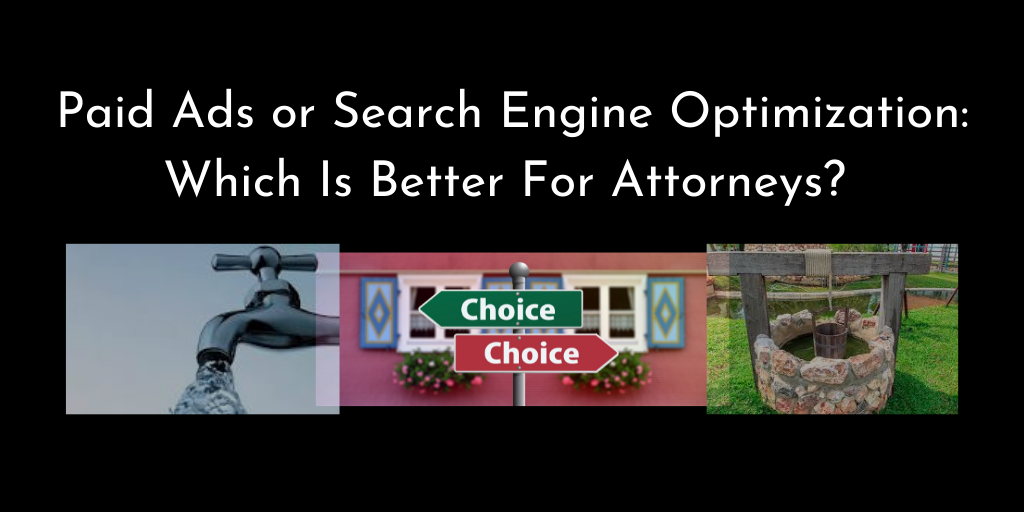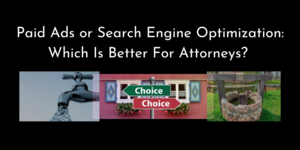With the continued rise in digital marketing in the legal profession, getting attention and driving traffic for law offices is getting more competitive. It costs more than ever too! Among the numerous options within the digital space, many are asking: Paid Search Ads or SEO – Which Is Better For Attorneys?
Editor’s Note:
For the purposes of this article, we are using the following basic definitions.
- The “Paid Search Ads” referenced here are Search-based Ads (i.e. Google Ads, Bing Ads, etc).
- These are ads served by search engines (along with organic search results) in response to a User’s query.
- They usually appear in the upper region of a Search Engine Results Page (SERP) paid for by advertisers.
- There are other digital advertising mediums (ex. Social Media Ads, Retargeting Ads, etc).
- Those can be a part of an overall paid ads strategy but are not the focus of this article.
- Search Engine Optimization (SEO) includes technical, content-based, and reputation-focused activities used to improve search rankings.
- Usually, these rankings appear below Search Ads and Local Search results.
- Good SEO practices can also positively influence rankings in the Local Search results based on your business location and defined service areas.
Key Points
- Either Paid Search Ads or SEO can produce positive results for legal practices. However, they often follow different pathways to increase traffic and clients.
- Paid Ads (or PPC) produce quick results. At the same time, they can become cost-prohibitive as prices rise. Also, do not forget that when ad spending stops; traffic stops!
- SEO builds results more slowly over time but has a compounding effect as your influence and authority increase.
- Long term, a blended strategy utilizing both PPC and SEO in a managed fashion produces some of the best overall results.
Paid Search Ads
Starting with Search Ads, you can begin to see responses as soon as you begin your campaign. Respondents from ads are some of the most ready-to-convert leads that you can acquire.

In any debate between Paid Search Ads versus Search Engine Optimization, Paid Ads work like a spigot for your Legal Practice. Properly setup to a source, turn them on; they produce.
David Adams, Sirus Digital Tweet
Pros
- As a mechanism to attract traffic (and customers), Ads provide some of the fastest and highest quality results. This is especially true for Paid Search Ads.
- Because you can target keywords, audiences, and locales to see results quickly, Search Ads represent a laboratory for testing and messaging.
- It is easier to scale when good targeting or messaging resonates (at least in the beginning).
Cons
- Cost/budget is a barrier for many attorneys. Search Ads, being so effective, are costly (especially in many legal specialties).
- Hint: Make budgetary judgments considering both cost and value. Does your law office have the capacity to satisfy these new clients? Accounting for cost and revenue, will ad-related marketing be profitable?
- Costs associated with all digital advertising continue to rise.
- Increased competition for keywords and traffic directly affects the costs charged to advertisers. (At higher scales, some advertisers can even compete with themselves by targeting certain audiences.)
- While traffic generated from Paid Search Ads represent some of the most motivated prospects, the average click-thru rate (CTR) for Paid Search Ads is just under 3% for the Legal industry.
- By comparison, the average click-thru rate for organic search listings is nearer to 30% (or as much as 10x higher).
Editor’s Note:
Keep in mind – some users habitually skip ads on Search Engine Results Pages (SERPs). They tend to interact only with organic results. While this is not the case with all users, we must acknowledge their statistical relevance.
In research published by Conductor as recently as 2018, over 60% of all clicks come from organic listings and 6% from paid ads. (The remaining 30-35% were usually non-clicks or the user re-ran their search with different keywords!)
This is a market and cultural reality that you must address when determining if Paid Ads or SEO is better for your legal practice.
User clicks from Paid Search Ads are often of higher quality from a conversion standpoint. However, they represent a smaller sampling of your overall audience compared to organic traffic.
Key Point
If you are looking for the quickest and most visible results and budget is not a concern, Paid Search Ads are your first choice. If you are seeking the most up-to-date data to guide your messaging and targeting, Paid Ads are the winner.
Just remember all ads represent a direct cost to you!
Search Engine Optimization (SEO)

When you start by focusing on Search Engine Optimization (SEO), you will have to put in work early on for what can seem like lesser returns initially. Similar to digging a well, it requires more persistence and follow-through to achieve an often longer-lasting return.
Overall, your respondents are more information-focused. However, their LCV (Lifetime Client Value) and retention rates -after making their decision- are measurably higher.
In the debate between Paid Search Ads versus SEO, SEO work more like a well. It takes more time and effort to being producing results, but your law firm can reap those benefits for a long time.
David Adams, Sirus Digital Tweet
Pros
- Once the content is created or technical elements are implemented, it can attract traffic perpetually (24×7).
- Organic results are scalable and tend to compound over time.
- Because of minimal maintenance expense over time (for content and technical implementations), Cost-Per-Acquisition (CPA) tends to reduce.
Cons
- There is an initial investment of time and expense before you get results. Measurable outcomes take time to develop.
- As more and more legal practices focus on SEO, it becomes more and more competitive to achieve high rankings.
- Similarly, traffic numbers fall off massively the lower you appear in the rankings.
- Due to differences between the target audiences, organic links from search engines do not convert as well as ads.
- Some maintenance expense is required over time as search engine algorithms change over time (often daily).
Key Point
The model that best supports a “long-tail” of attention/traffic and nurtures them into your highest-value clients is SEO. Assuming you do not quit before you achieve momentum, few models offer the organic potential for being a dominant player within your market and locale. It simply requires persistence and consistency – especially early on when you are not yet seeing the benefits.
Editor’s Note:
Check out this post that goes into more detail about Search Engine Optimization for Law Offices and shares techniques you can implement in your practice.
Which Is Better For Your Law Firm - Paid Search Ads or Search Engine Optimization?
Determining whether Paid Search Ads or SEO is “better” is wholly dependent upon the unique characteristics of your legal practice. Those characteristics include budget, skills/capability, and amount of patience for awaiting visible results. Based upon each of these relevant measures, either model (or possibly – a blend of each) might be the “best” option.
Here are some different sizes of law firms and how their individual strategies might look.
Single Member/Local Office
For lawyers who own their own practice or smaller local legal offices, Paid Search Ads offer quick, scalable results. These can be started and stopped based on business flow, capacity, or planned growth initiatives.
Over time, a well-structured Paid Search Ad strategy can truly act like that “business spigot” to be turned on and off as needed.
Editor’s Note:
While it is not the focus of this article, law offices of this size can benefit from the use of organic (and paid) outreach via Social Media. These might represent platforms like Facebook, Instagram, LinkedIn, or YouTube. Many legal offices of this type are deeply rooted in their communities. Social Media offers a powerful engagement opportunity to help attract new clients.
For ideas on how you can utilize Social Media to garner more attention (and new customers), check out this YouTube video. (Digital Marketing for Attorneys using Social Media)
Mid-sized/Multi-Office Practices
For mid-sized practices or those with multiple offices, a Paid Search Ad strategy is almost always a good place to start. While there is an initial investment in the program, the speed and visible nature of results help justify the budgetary spend.
When business/traffic is lighter or the firm has available capacity, Search Ads can be put in place and activated quickly to generate more leads. During busier times or times when there are staffing/capacity constraints, the ads can be slowed (or disabled) to stem the flow of new business.
Again, the “turn it on”/”turn it off” flexibility makes this a solid starting point for law offices of this size.
Additionally, it is also a good practice for law offices in this group to be targeting some budget and attention toward SEO & organic reach. It is a slower path to growth. However, it creates a traffic (and business) source which can produce results over many years.
Utilizing this combined approach offers immediate and long-term benefits. You can gain the immediate benefits of more “close-ready” clients from Paid Ads. Likewise, you build a nurturing program for converting “interested” audiences into clients over time.
Regional/Urban Practice
Larger regional or urban law practices have the budget (and often in-house marketing staff) to implement a combined strategy. It should encompass both Paid Search Ads as well as SEO. For them, the question is not “Is Paid Search Ads or SEO better for our law firm?”, but how can we implement a strategy targeting both?
From an audience and engagement standpoint, this multi-channel strategy should include paid and organic outreach via Social Media as well.
- Paid Search Ads act as a configurable source of traffic. They also serve as an information goldmine for keywords, audience characteristics, and insight into market evolution.
- Search Engine Optimization ensures consistently high organic rankings and traffic. We accomplish this using content development, technical website maintenance, and reputation management. Our goal is to lower costs to acquire new clients (CTAs).
- Social Media Management (not covered in this article) promotes greater audience engagement and client satisfaction. Utilizing your platforms as contact points with clients (and potential clients) deepens relationships with them.
Utilizing the available budgets and people assets that larger law firms have at their disposal, a multi-faceted digital strategy serves as a primary driver for positive growth and profitable returns.
Editor’s Note:
As an additional facet to your overall Digital Strategy, check out Content Marketing for Bankruptcy Attorneys, this post gives suggestions for developing content focused on your law office’s specific services and characteristics.
Combined as an overall part of our SEO efforts (keywords, etc.), this is another tool that helps make your overall digital efforts more effective.
Final Thoughts
As noted earlier, determining which option (Paid Search Ads or SEO) is largely dependent upon unique factors of each law practice’s situation.
- Paid Ads produce some of the fastest results and provide a wealth of actionable data/information about your target audience. However, if you stop spending money on ads, those benefits stop.
- Search Engine Optimization affords the best long-term, scalable results with the highest Lifetime Customer Value (LTV). This continues to produce results long after your initial investment. Unfortunately, these benefits are the slowest to manifest. This spending can be difficult to justify early on when results are slow to develop.
It is for these reasons that we recommend a blended strategy where it is feasible. Assuming an adequate budget to target both effectively, investing in both produces dual benefits. It helps produce measurable results at the early stages. Also, you are building a consistent foundation driving client acquisition for the long term.
In the case that there simply is not the budget (or commitment) for a blended strategy, start with Paid Search Ads. Once in motion, reinvest some gains into developing your blended/multi-channel strategy.
References
- SirusDigital.com: Content Marketing for Bankruptcy Attorneys
- YouTube: Digital Marketing for Attorneys using Social Media
- SeoRoundtable.com: Most Search Marketers say Google Ads CPC are up
- Wordstream.com: Google Ads Industry Benchmarks
- Conductor.com: Paid Vs. Organic Search: The Epic Showdown



